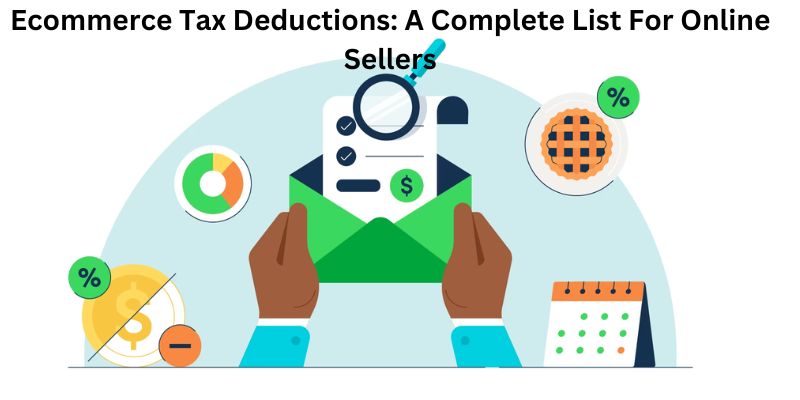Ecommerce Tax Deductions: A Complete List For Online Sellers
Triston Martin
Nov 16, 2023
Are you an online seller looking to maximize your ecommerce earnings? Operating an ecommerce business involves more than just selling products and making money; it’s also about managing finances and taking advantage of all the tax deductions available to you.
Doing this can help reduce your taxable income, eventually leading to more profits for your business. To get started on finding the right deductions for your ecommerce store, we've compiled a comprehensive list detailing all the available tax deductions specific to online sellers so that you can ensure you're getting every penny back from Uncle Sam!
Overview of What Are Tax Deductions for Online Sellers
Tax deductions are an important aspect of running any business, especially Ecommerce. As an online seller, there are certain deductions available to you that can help reduce your taxable income and increase your profits. Knowing which deductions you’re eligible for is essential to maximizing your ecommerce business.
Ecommerce tax deductions include more than just expenses related to operating the business. Other broader categories, such as home office deductions, vehicle mileage, travel expenses, and health insurance premiums, also apply to online sellers.
When used correctly together with your other expense records, these deductions can make a huge difference in reducing your overall taxes owed.
When deducting specific items from your taxes, the Internal Revenue Service (IRS) allows certain deductions specific to online sellers. This includes web hosting fees, shipping costs, credit card processing fees, advertising expenses, and more.
Additionally, depending on your ecommerce business activities, you may be eligible for other tax deductions, such as charitable contributions or investment losses.
Types of Expenses That Qualify for Tax Deductions
Home office deductions
Home office deductions are typically only available to those who work from home as part of their online business activities. Generally, expenses for setting up and operating a home office can be deducted from your taxes.
This includes furniture, computers, desk supplies, internet costs, rent or mortgage payments for the space used exclusively as an office, and other overhead costs associated with running your business from home.
Remember that if you use a portion of your home for personal and business-related activities, only the amount used directly for business purposes is eligible for deduction.
Vehicle mileage
Business owners who use their vehicles in connection with their ecommerce business are eligible to deduct the associated costs from their taxes. This applies to mileage and gas expenses incurred while running your business, such as making deliveries or visiting vendors.
When claiming vehicle deductions, document all trips related to your ecommerce activities—including travel dates, destination locations, and total miles—to provide an accurate record for the IRS if necessary.
Travel expenses
Online sellers may also be able to deduct certain travel-related expenses from their taxes. Eligible items include hotel stays, meals while away on business, conference fees, airfare, taxi fares, rental cars, and other transportation costs related to business travel. Remember that you can only deduct the money spent directly on business expenses, not personal ones.
Health insurance premiums
Health insurance is an important part of staying healthy and avoiding expensive medical bills, but it’s also a tax deduction for online sellers with qualifying health plans. Generally speaking, self-employed individuals can deduct up to 100% of their health insurance premiums from their taxes when filing each year.
Depending on your circumstances, you may qualify for other deductions, such as dental and vision costs or long-term care insurance premiums.
Web hosting fees
Maintaining a website or other online presence is essential for any ecommerce business. That's why the IRS allows online sellers to deduct certain costs associated with web hosting and domain registration fees from their taxes. This includes monthly subscription fees, setup costs, and any additional expenses related to building and managing your site.
Shipping costs
The cost of shipping products directly to customers is an important aspect of running an ecommerce business. Fortunately, these costs are eligible for deduction when filing your taxes. This applies to outbound items as well as returns—so long as they were sent in the course of operating your business.
Credit card processing fees
Accepting customer payments via credit cards is a common practice for online sellers, and it can also incur certain fees. These charges can be deducted from your taxes, including merchant account fees and any other costs associated with accepting credit cards as payment. Remember that only the amount spent on these services qualifies for deduction—not any profits made through credit card sales.
Strategies to Maximize Your Tax Deductions as an Ecommerce Seller
- Track your expenses religiously – Keeping accurate records of all your ecommerce-related expenses is essential for maximizing your tax deductions. Be sure to document everything, from web hosting fees and shipping costs to meals and travel expenses.
- Take advantage of deductions specific to online sellers – Don’t forget about the special deductions available to you as an online seller. These include credit card processing fees, advertising, charitable contributions, etc.
- Consider utilizing a professional accountant - Working with a knowledgeable accountant or tax adviser can help ensure you’re taking full advantage of all the available ecommerce tax deductions for your business. This expert can also provide valuable advice on how best to structure your finances and help you plan for the future.
Tips to Make Sure You Don’t Overlook Any Eligible Tax Deduction
- Read up on the latest tax laws – Staying abreast of the most recent changes in federal and state tax regulations can help you identify any new deductions available to your business.
- Keep track of all expenses throughout the year – Establishing an effective system for tracking your ecommerce-related expenses can make it much easier to spot any potential deductions when filing taxes each year.
- Take advantage of online resources – Investigate online tools specifically designed for small businesses to help you keep track of finances and maximize tax deductions.
FAQs
Q: What types of ecommerce tax deductions are available?
A: There are a variety of tax deductions available to online sellers, depending on your business model and operational setup. Generally speaking, these tax deductions can be broken down into three primary categories.
These include deductions related to advertising, employee salaries, shipping costs, and office supplies; deductions related to depreciation (such as for computer equipment and furniture); and any other miscellaneous expenses that may apply.
Q: Do I need to keep detailed records of my ecommerce transactions?
A: Yes! Keeping accurate records is essential for claiming the right tax deduction amount. Be sure to save receipts from all purchases made for the operation of your ecommerce store, as well as any other documents related to your business expenses.
This will help ensure you can properly calculate and document the amount of ecommerce tax deductions you're eligible for.
Q: What are some common items I can deduct from my taxes?
A: Some common items that online sellers may be able to deduct from their taxes include advertising costs, employee salaries (if applicable), shipping costs, office supplies, software/service subscriptions, and depreciation on computer equipment or furniture used in your operations.
Additionally, depending on your particular set-up, you can claim some miscellaneous deductions related to the operation of your ecommerce business.
Conclusion
Maximizing your ecommerce earnings starts with understanding the available tax deductions for online sellers. By taking full advantage of all the available deductions, you can ensure you get every penny back and profit from your business as much as possible.
With our comprehensive list detailing all the different types of ecommerce tax deductions, you can navigate your taxes like a pro and get closer to achieving maximum profits for your business









